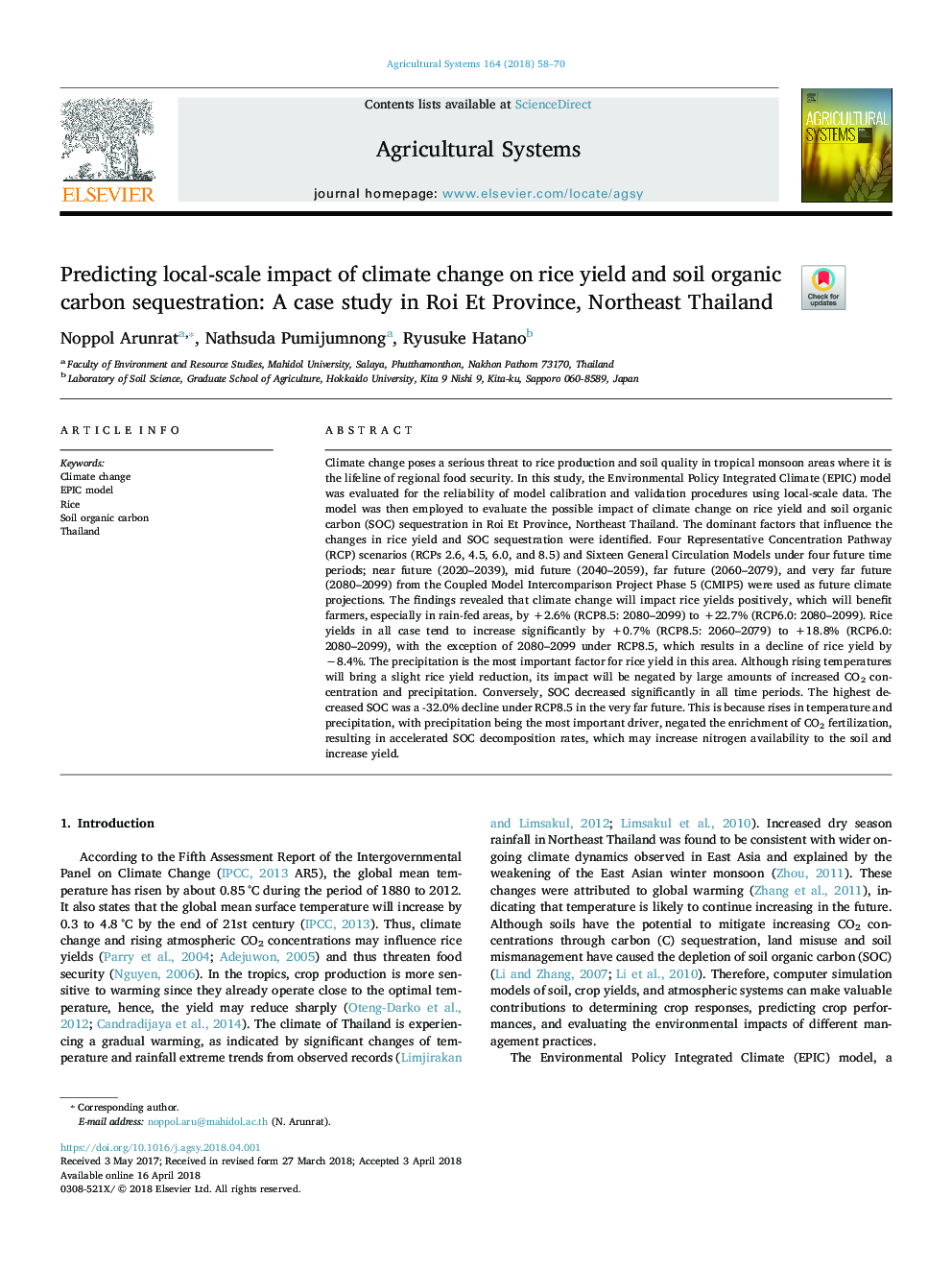| کد مقاله | کد نشریه | سال انتشار | مقاله انگلیسی | نسخه تمام متن |
|---|---|---|---|---|
| 8874961 | 1623206 | 2018 | 13 صفحه PDF | دانلود رایگان |
عنوان انگلیسی مقاله ISI
Predicting local-scale impact of climate change on rice yield and soil organic carbon sequestration: A case study in Roi Et Province, Northeast Thailand
ترجمه فارسی عنوان
پیش بینی تاثیر منطقه ای بر تغییرات آب و هوایی بر عملکرد برنج و تسهیل جذب کربن آلی خاک: مطالعه موردی در استان رویت، شمال شرقی
دانلود مقاله + سفارش ترجمه
دانلود مقاله ISI انگلیسی
رایگان برای ایرانیان
کلمات کلیدی
موضوعات مرتبط
علوم زیستی و بیوفناوری
علوم کشاورزی و بیولوژیک
علوم کشاورزی و بیولوژیک (عمومی)
چکیده انگلیسی
Climate change poses a serious threat to rice production and soil quality in tropical monsoon areas where it is the lifeline of regional food security. In this study, the Environmental Policy Integrated Climate (EPIC) model was evaluated for the reliability of model calibration and validation procedures using local-scale data. The model was then employed to evaluate the possible impact of climate change on rice yield and soil organic carbon (SOC) sequestration in Roi Et Province, Northeast Thailand. The dominant factors that influence the changes in rice yield and SOC sequestration were identified. Four Representative Concentration Pathway (RCP) scenarios (RCPs 2.6, 4.5, 6.0, and 8.5) and Sixteen General Circulation Models under four future time periods; near future (2020-2039), mid future (2040-2059), far future (2060-2079), and very far future (2080-2099) from the Coupled Model Intercomparison Project Phase 5 (CMIP5) were used as future climate projections. The findings revealed that climate change will impact rice yields positively, which will benefit farmers, especially in rain-fed areas, by +2.6% (RCP8.5: 2080-2099) to +22.7% (RCP6.0: 2080-2099). Rice yields in all case tend to increase significantly by +0.7% (RCP8.5: 2060-2079) to +18.8% (RCP6.0: 2080-2099), with the exception of 2080-2099 under RCP8.5, which results in a decline of rice yield by â8.4%. The precipitation is the most important factor for rice yield in this area. Although rising temperatures will bring a slight rice yield reduction, its impact will be negated by large amounts of increased CO2 concentration and precipitation. Conversely, SOC decreased significantly in all time periods. The highest decreased SOC was a -32.0% decline under RCP8.5 in the very far future. This is because rises in temperature and precipitation, with precipitation being the most important driver, negated the enrichment of CO2 fertilization, resulting in accelerated SOC decomposition rates, which may increase nitrogen availability to the soil and increase yield.
ناشر
Database: Elsevier - ScienceDirect (ساینس دایرکت)
Journal: Agricultural Systems - Volume 164, July 2018, Pages 58-70
Journal: Agricultural Systems - Volume 164, July 2018, Pages 58-70
نویسندگان
Noppol Arunrat, Nathsuda Pumijumnong, Ryusuke Hatano,
